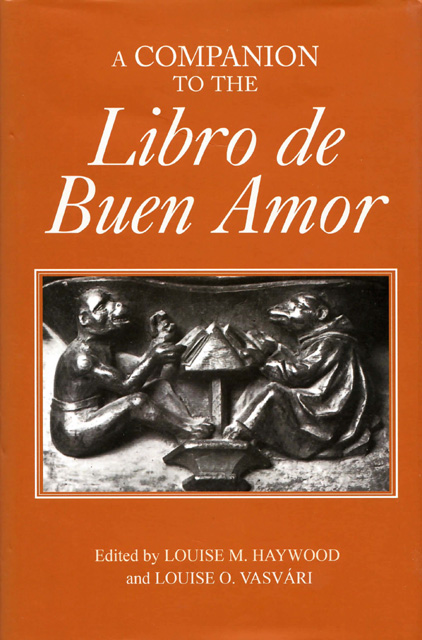Book contents
Exempla and Proverbs in the Libro de Buen Amor
Published online by Cambridge University Press: 10 May 2023
Summary
When Juan Ruiz wrote his Libro, he drew on traditions of stories and sayings, Latin and vernacular, written and oral. Their presence throughout the book exemplifies its fusion of popular and learned. This survey of brief sayings and short narratives in the Libro is intended to define certain genres, to indicate the traditions underlying Ruiz’s use of them, and to point to the coexistence of high and low culture in his work.
‘Exempla’
An exemplum (plural: exempla) is a short story with a message. In the words of J.-Th. Welter:
Par le mot exemplum, on entendait, au sens large du terme, un récit ou une historiette, une fable ou une parabole, une moralité ou une description pouvant servir de preuve à l’appui d’un exposé doctrinal, religieux ou moral.
(Welter 1927: 1)(By exemplum was understood, in the broad sense of the term, a narrative or short story, a fable or a parable, a morality or a description which could support a doctrinal, religious or moral exposition)
There are thirty-two such tales in the Libro (see Table I).
Juan Ruiz uses various names for the exemplum. Old Spanish terminology was flexible, and the same term could be used for both of the brief sentential forms, proverb (see pp. 97–100) and exemplum. To refer to exemplum we find in the Libro: ‘fabla’ (96d, 320d, 407d, 1386d, 1453d), ‘muchas fablas e historia paladina’ (297c), ‘enxienplo’ (311d, 529d, 1411c; as well as ‘enxienplo’ passim in the non-authorial rubrics), ‘fazaña’ (457a, 474a), ‘mis fablas e mis fazañas’ (908d). On one occasion fabla refers unambiguously to animal fable: ‘fabla [. . .] de Isopete sacada’ (96d; a fable taken from Aesop). The phrase ‘Las viejas tras el fuego ya dizen sus pastrañas’ (1273d; The old women now tell their tales round the fire), does not help our investigation, as it refers to a pictorial representation of old women whose pastrañas are unrecorded. Not relevant to our purpose is ‘romance’ (904a), which indicates a longer narrative.
From the earliest written witnesses onwards, the message of the exemplum is made explicit either in an introduction (promythium) or conclusion (epimythium; Perry 1940).
- Type
- Chapter
- Information
- A Companion to the Libro de Buen Amor , pp. 83 - 104Publisher: Boydell & BrewerPrint publication year: 2004
- 1
- Cited by



